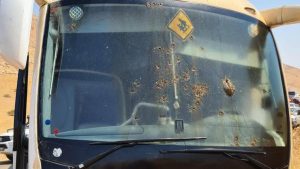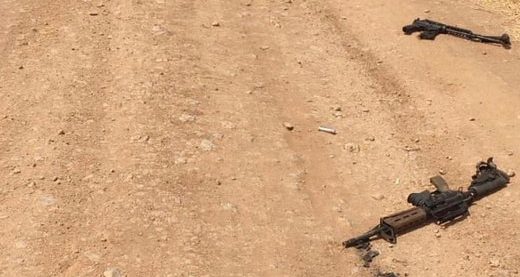by Kobi Michael
Israel's management of the conflict in the format of "mowing the grass” is reaching the limit of its effectiveness and could even lead to a large-scale violent outbreak
The recent bus attack in the Jordan Valley represents an additional facet of the Palestinian resistance ethos that is shaped in the spirit of Islamic Jihad in collaboration with Hamas and with Fatah’s al-Aqsa Brigades, and with the encouragement of Iran and Hezbollah. Israel’s strategy of conflict management, which has led to a rise in the number Palestinian casualties and detainees, and the ensuing reverberations in the social media, intensifies the resistance ethos. Israel is approaching the point where it has realized the potential of this strategy, and the current norms will have to change
The attack on September 4, 2022 in the Jordan Valley was not surprising, neither in its being a shooting attack – even if it was unusual in terms of how it was planned and the intention to set the bus on fire along with its passengers, nor in its timing, nor regarding its perpetrators. Nor are the supportive and aggressive responses of Hamas, Islamic Jihad, and the al-Aqsa Brigades surprising, and the lack of response from the Palestinian Authority is not new. This attack was another tree in the expanding forest of terrorism, and another chapter in the Palestinian ethos of resistance that is taking shape in the spirit of Islamic Jihad in collaboration with Hamas and Fatah's al-Aqsa Brigades, and evolves with the encouragement of Iran and Hezbollah. Particularly in light of recent events, it is important to examine the entire forest, and not to focus on only one of the trees.
The attack on the bus is part of a trend evident since March 2022, which began with terrorist attacks within the State of Israel. The Jenin region became the export center of the terrorist actions, after a long period during which Islamic Jihad, with the funding of Iran and Hezbollah and with their active assistance in smuggling weapons into the West Bank, succeeded in becoming the strongest and most significant organization in the area. The organization, which is operated as an Iranian proxy, is free of any commitment or responsibility toward the local population. The purpose of its existence is adherence to the idea of armed resistance, and it is an important and convenient means for Iran to undermine stability in the region and enhance the struggle against Israel. The organization has established networks of collaboration with Hamas and with the Fatah armed militias, and it leads a systematic effort to recruit young people who do not necessarily belong to a particular organization, and others who have an organizational affiliation, to carry out acts of terrorism in exchange for (Iranian) money. The terrorism hub that operated from the Jenin region under the leadership of Islamic Jihad has migrated to the Nablus region due to the difficulties created by the Israeli security forces, who operated intensively in the region, but it has not entirely died out. Evidence of this is that the perpetrators of the bus attack came from the area.

Furthermore, the activity of the Israeli security forces in the Jenin area has led to a significant rise in the level of tension with the civilian population and in the level of violence in encounters with groups of armed Palestinians. The Israeli activity, which focuses on isolated operations by undercover counterterrorism units, is met by armed militants who attempt to disrupt IDF operations, engaging Israeli forces up close and with gunfire. This involves several hundred operatives who make a concerted effort against IDF forces while documenting the events and immediately disseminating the account on social media. Despite the large number of arrests and the significant increase in the number of Palestinian deaths and injuries, the Palestinian ethos of resistance has gained strength and spread throughout the West Bank, while in parallel the operations to arrest operatives and prevent terrorism have expanded in these areas.
Alongside Islamic Jihad's ongoing effort, Hamas has continued its military buildup efforts in the region under the direction of Saleh al-Arouri. For their part, Fatah's al-Aqsa Brigades have continued to distinguish themselves from the Palestinian Authority and joined the armed struggle, both against IDF forces operating on the ground and in the effort to carry out terrorist attacks. In the spirit of the traditional cooperation between the organizations in the Jenin region, the cooperation between the organizations has deepened.
Economic distress in itself is not a factor that explains the phenomenon. Rather this is an expanding cognitive struggle that is fed by the increased violent friction with IDF forces, by the sense of success, and in particular by the governmental vacuum of the Palestinian Authority. The image and standing of the PA have been severely undermined in the eyes of the Palestinian public due to its failure to advance the national vision and to offer a political horizon. The governmental vacuum is reflected in part in that the Palestinian security apparatuses prefer to refrain from taking determined action against the armed militias – aside from exceptional cases against Hamas efforts that the PA leadership sees as threatening its stability and its very survival. This is also the background to the involvement of operatives from the security forces or their children in the terrorist attacks. The extent of this phenomenon, even if it still relatively small, is worrisome and indicates the difficulty facing the security apparatuses in taking action against these efforts.
In the current conditions, the Palestinian Authority is not able to surmount its frailty. The continuation of the Israeli security effort to thwart terrorist infrastructure will necessarily lead to a further increase in friction and in the number of Palestinian casualties, and Israel is quickly approaching a strategic dilemma. Israel could opt for a renewed effort at a political initiative leading toward separation: even if a final status agreement is not feasible in the foreseeable future, it will still signal Israeli recognition of the Palestinian Authority as a partner in an agreement-oriented process, improve conditions for improving governance and the economy in PA territory, and encourage strengthening it as an alternative to those leading the armed resistance Alternatively, Israel can launch a large-scale military operation, such as in 2002 in Operation Defensive Shield, to crush the terrorist infrastructure that is developing throughout the northern West Bank and creeping southward. In any case, Israel should make a more systematic and significant effort to prevent the smuggling of money and weapons mainly led by Iran and Hezbollah, which are sustaining the terrorist infrastructure.

The dual strategy that Israel is pursuing in the Palestinian arena – containment of Hamas, which includes economic relief measures and limited military responses, while taking determined action against attacks in the West Bank – provides fertile ground for the intensification of the Palestinian ethos of resistance and inadvertently contributes to the weakening of the Palestinian Authority. Against this backdrop, the Palestinian security apparatuses are seen as elements that collaborate with Israel at the expense of the Palestinian national interest. From the perspective of the armed Palestinian operatives, the cost of the violent friction with IDF forces is not overly high. Palestinian heroes are born each day and the sense of capability and expectations of the armed struggle are rooting further in the hearts and collective consciousness of the younger generation and providing motivation to join the struggle. But Israel's management of the conflict in the format of “mowing the grass" is reaching the limit of its effectiveness and could even lead to a large-scale violent outbreak, while it addresses the individual trees and not the forest, which is the real strategic challenge before it.
Kobi Michael is a senior research fellow at INSS and editor of "Strategic
Assessment". Dr. Michael served as the deputy director general and head
of the Palestinian desk at the Ministry for Strategic Affairs. He was a
member of the faculty at Ben Gurion University (2008-2011), a senior
faculty member at Ariel University (2013-2015), and a visiting professor
at Northwestern University in Illinois (2006-7) and Peking University
in Beijing (2017).
Source: https://www.inss.org.il/publication/the-bus-attack-on-route-90/
No comments:
Post a Comment